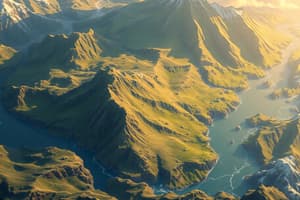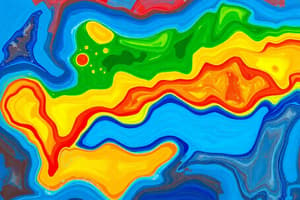Podcast
Questions and Answers
Which of the following factors influenced the formation of political boundaries?
Which of the following factors influenced the formation of political boundaries?
- Cultural factors and geopolitical considerations
- Economic factors and strategic advantage
- Geographical factors and colonialism (correct)
- Strategic advantage and historical divisions
What role did colonial powers play in shaping the political boundaries of many nations?
What role did colonial powers play in shaping the political boundaries of many nations?
- They respected existing territorial boundaries and traditional divisions
- They focused solely on cultural or ethnic divisions
- They disregarded existing territorial boundaries and traditional divisions (correct)
- They consulted indigenous people before drawing borders
What was the primary driving force behind the process of border creation during the colonial period?
What was the primary driving force behind the process of border creation during the colonial period?
- Economic interests and strategic advantage (correct)
- Geopolitical considerations and cultural factors
- Respect for indigenous people and historical divisions
- Ethnic divisions and traditional boundaries
What lasting effects did the arbitrary drawing of borders by colonial powers have on the political landscape of many countries?
What lasting effects did the arbitrary drawing of borders by colonial powers have on the political landscape of many countries?
Which factor was often prioritized over respect for existing cultural or ethnic divisions during border creation by colonial powers?
Which factor was often prioritized over respect for existing cultural or ethnic divisions during border creation by colonial powers?
What is the main focus of this article on political boundaries?
What is the main focus of this article on political boundaries?
What has historically served as natural barriers, influencing the delineation of borders between nations?
What has historically served as natural barriers, influencing the delineation of borders between nations?
Which factor has influenced the placement of political boundaries due to economic and strategic significance?
Which factor has influenced the placement of political boundaries due to economic and strategic significance?
What has often been contested due to economic and strategic significance, leading to the establishment of political borders that reflect these underlying factors?
What has often been contested due to economic and strategic significance, leading to the establishment of political borders that reflect these underlying factors?
In which regions do climate and environmental factors play a role in the demarcation of borders?
In which regions do climate and environmental factors play a role in the demarcation of borders?
What has often led to the division of ethnic groups, the amalgamation of disparate communities, and the imposition of foreign rule?
What has often led to the division of ethnic groups, the amalgamation of disparate communities, and the imposition of foreign rule?
What has further fueled border disputes and territorial conflicts in addition to historical grievances?
What has further fueled border disputes and territorial conflicts in addition to historical grievances?
What can border disputes lead to in extreme cases?
What can border disputes lead to in extreme cases?
What have become entrenched in national identity and pride, making resolution challenging?
What have become entrenched in national identity and pride, making resolution challenging?
Which examples are poignant examples of the enduring impact of unresolved border disputes?
Which examples are poignant examples of the enduring impact of unresolved border disputes?
What plays a significant role in the formation of political boundaries?
What plays a significant role in the formation of political boundaries?
Flashcards are hidden until you start studying
Study Notes
Political boundaries are the lines that separate one political entity from another, whether it's a country, state, or region. The formation of these boundaries is a complex process influenced by historical, cultural, and geographical factors. In this article, we will explore the intricacies of the formation of political boundaries, with a focus on the impact of colonialism and border creation, the influence of geography on borders, and the conflicts and disputes that often arise as a result.
Colonialism and Border Creation
Colonialism played a pivotal role in shaping the political boundaries of many nations around the world. During the colonial era, European powers such as Britain, France, Spain, and Portugal established colonies in various regions, often disregarding existing territorial boundaries and traditional divisions. The arbitrary drawing of borders by colonial powers, often without consideration for the indigenous people or historical divisions, has had lasting effects on the political landscape of many countries.
The process of border creation during the colonial period was often driven by economic interests, strategic advantage, and geopolitical considerations rather than respect for existing cultural or ethnic divisions. This often resulted in the fragmentation of indigenous communities, the merging of disparate groups, and the imposition of foreign rule on diverse populations. The legacies of these colonial borders continue to shape modern-day political boundaries and have contributed to ethnic and territorial disputes in regions across the globe.
Impact of Geography on Borders
Geography plays a significant role in the formation of political boundaries. Natural features such as rivers, mountains, and deserts have historically served as natural barriers, influencing the delineation of borders between nations. In some cases, these natural features have acted as effective boundaries, demarcating distinct territories and shaping the political landscape. For example, the Andes mountains have long served as a natural boundary between countries in South America, influencing the formation of political borders in the region.
Furthermore, the availability of natural resources, access to trade routes, and strategic military considerations have also influenced the placement of political boundaries. Coastal regions, fertile plains, and mineral-rich areas have often been contested due to their economic and strategic significance, leading to the establishment of political borders that reflect these underlying factors. Additionally, the impact of climate and environmental factors has also played a role in the demarcation of borders, particularly in regions where access to water and arable land is a critical concern.
Conflict and Border Disputes
The formation of political boundaries has frequently been a source of conflict and dispute. As mentioned earlier, the arbitrary nature of colonial border creation has often led to the division of ethnic groups, the amalgamation of disparate communities, and the imposition of foreign rule, contributing to long-standing tensions and conflicts. Additionally, the contestation of valuable resources, historical grievances, and competing national interests have further fueled border disputes and territorial conflicts.
Border disputes can take various forms, ranging from diplomatic disagreements and legal wrangling to outright military confrontations. These disputes often have deep historical roots and can become entrenched in national identity and pride, making resolution challenging. The impact of border disputes can be profound, leading to human displacement, economic instability, and, in extreme cases, armed conflict. The ongoing dispute between India and Pakistan over the region of Kashmir and the contested border between Israel and Palestine are poignant examples of the enduring impact of unresolved border disputes.
In conclusion, the formation of political boundaries is a multifaceted process shaped by historical, cultural, and geographical factors. The legacy of colonialism, the influence of geography, and the prevalence of border disputes all contribute to the complex nature of political boundaries. Understanding the dynamics of border formation and its impact is crucial for addressing contemporary challenges related to territorial sovereignty, ethnic conflicts, and geopolitical stability.
Studying That Suits You
Use AI to generate personalized quizzes and flashcards to suit your learning preferences.




